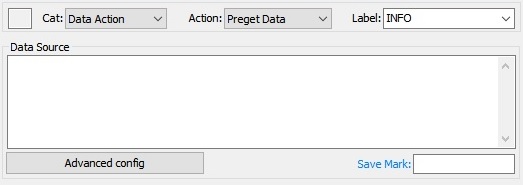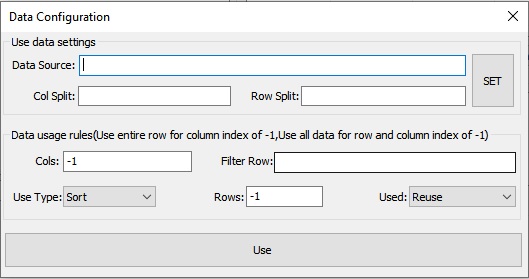
Prefetch data, prefetch data
Save Mark: save the acquired data to the variable, Data including the number of rows, the number of columns, specific data, data of a certain column in the same row, etc. (click the information save identifier to call it);
In addition to acquiring data, this operation can also judge whether a data is an expected value. If the data acquisition fails, the process returns failure, and then the process judges whether to end the application according to the requirements?Or skip to another process?
Click Advanced Configuration to get more data sources

Data source: it can be cloud data, file, folder, network address, etc. Click SET to select the data source
Col Split: the delimiter of each column of data, the default is: spaces
Row Split: the separator of each line of data, the default is: carriage return
Cols: return a column of data, "-1" whole row of data; "-1" cannot be filled when a column is called by a save mark
Filter Row: The returned row data must meet the conditions. A configuration box will pop up when you click Fill
Rows: return a row of data, "-1" whole row of data; Fill in the $LAST_ROW to use the last line; Ctrl+Alt+T sets to use the line according to the time condition
Used: mainly used for row data return. When the last row is used, the next call will start from the first row or end the operation.
Notice: When "-1" is filled in both rows and columns, all data is used without splitting
What does the row and column separator mean?
For example, there are the following data:
User1 Account1 Password1
User2 Account2 Password2
User3 Account3 Password3
There are three rows and three columns of data. The first row of user1, account1 and password1 are separated into columns by spaces, so the column separator of the data is space. User1 account1 password1 is one row, and user2 account2 password2 is the next row. Each row is separated into rows by carriage return, so the row separator of the data is carriage return.
Data is divided into rows and columns to facilitate the storage and use of data, such as the login account and password of the website:
Account1 Password1
Account2 Password2
When the system operates to log in to a website, it can directly call the account and password in the same line to log in. If the data is not in the same line, the login will fail.
----------------------------------------------------------------------------------------
Note: The number of columns and rows starts at 0.For example, if we want to call "password 2", then the number of columns should be filled in 2 and the number of rows should be filled in 1.
----------------------------------------------------------------------------------------